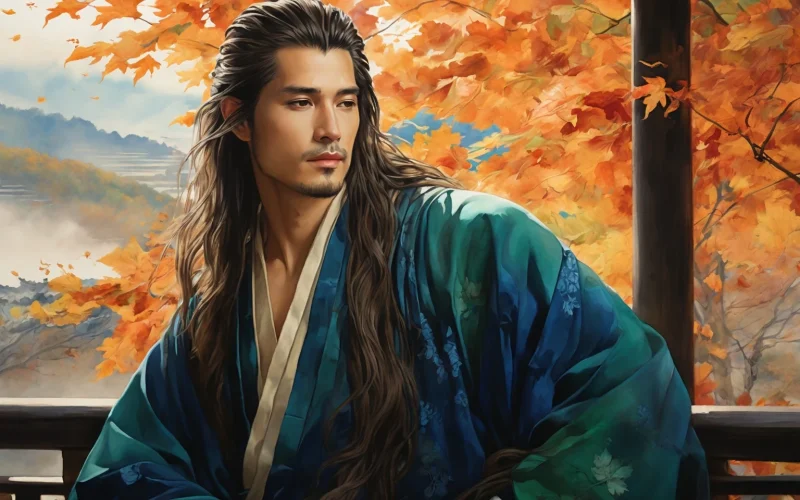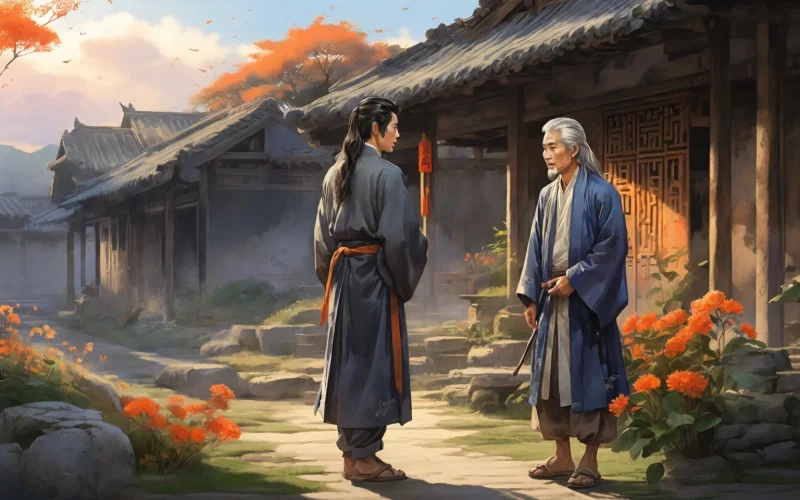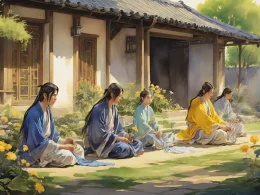While young, I used to be carefree,
Only indulged in lute and books.
Plain dress did not reduced my glee,
Nor did course food impair my looks.
As chance would have it, disinclined,
I drove up my official way.
Staff in hand, I made up my mind
To leave my garden for a day.
Far, far away goes my lonely boat;
Long, long my home thoughts haunt my heart.
Is it not a long journey afloat?
A thousand miles keep us apart.
Changing river scenes tire the eye;
Of hillside cot my mind still dreams.
Seeing birds and clouds, I feel shy
And envy fish swimming in streams.
To nature I’ve ever been true.
Who says my mind is matter-bound?
But the current I must go through,
Then in seclusion I’ll be found.
Original Poem
「始作镇军参军经曲阿作」
陶渊明
弱龄寄事外,委怀在琴书。
被褐欣自得,屡空常晏如。
时来苟冥会,宛辔憩通衢。
投策命晨装,暂与园田疏。
眇眇孤舟逝,绵绵归思纡。
我行岂不遥,登降千里余。
目倦川途异,心念山泽居。
望云惭高鸟,临水愧游鱼。
真想初在襟,谁谓形迹拘?
聊且凭化迁,终返班生庐。
Interpretation
Composed in 404 CE when the forty-year-old Tao Yuanming, constrained by poverty, reluctantly accepted General Liu Yu's invitation to serve as military advisor in Jingkou (modern Zhenjiang). This poetic travelogue through Qu'a (modern Danyang) reveals his inner conflict between official duty and pastoral ideals, expressing profound homesickness and unwavering commitment to eventual reclusion despite temporary political compromise.
First Stanza: "弱龄寄事外,委怀在琴书。被褐欣自得,屡空常晏如。"
Ruò líng jì shì wài, wěi huái zài qín shū. Bèi hè xīn zì dé, lǚ kōng cháng yàn rú.
Youth pledged to transcend worldly affairs, My heart entrusted to lute and texts. Coarse-clad yet content, Often penniless but always serene.
The opening establishes his lifelong detachment from worldly pursuits and contentment in simple scholarly pleasures, setting the poem's contemplative tone.
Second Stanza: "时来苟冥会,宛辔憩通衢。投策命晨装,暂与园田疏。"
Shí lái gǒu míng huì, wǎn pèi qì tōng qú. Tóu cè mìng chén zhuāng, zàn yǔ yuán tián shū.
Now circumstance dictates this reluctant encounter, Like reining my horse at a crossroads. Gathering books, ordering morning preparations - Briefly parting from my gardens and fields.
Acknowledges official service as situational compromise ("reluctant encounter"), emphasizing its temporary nature.
Third Stanza: "眇眇孤舟逝,绵绵归思纡。我行岂不遥,登降千里余。"
Miǎo miǎo gū zhōu shì, mián mián guī sī yū. Wǒ xíng qǐ bù yáo, dēng jiàng qiān lǐ yú.
My lonely boat drifts into the distance, While endless thoughts of home wind backward. This journey stretches far indeed - Climbing and descending over a thousand li.
The solitary boat becomes a powerful metaphor for his spiritual isolation, with physical distance intensifying homesickness.
Fourth Stanza: "目倦川途异,心念山泽居。望云惭高鸟,临水愧游鱼。"
Mù juàn chuān tú yì, xīn niàn shān zé jū. Wàng yún cán gāo niǎo, lín shuǐ kuì yóu yú.
Weary eyes see strange river roads, While my heart dwells in mountain marshes. Gazing at clouds, I shame before soaring birds; Facing water, I blush before swimming fish.
Reaches emotional climax through poignant nature metaphors - feeling inferior to creatures embodying the freedom he has temporarily abandoned.
Fifth Stanza: "真想初在襟,谁谓形迹拘?聊且凭化迁,终返班生庐。"
Zhēn xiǎng chū zài jīn, shéi wèi xíng jī jū? Liáo qiě píng huà qiān, zhōng fǎn Bān shēng lú.
My true aspiration remains intact - Who says outward circumstances can bind it? For now I'll follow fortune's changes, But ultimately return to Ban's hermitage.
Concludes with philosophical resolution: while temporarily yielding to circumstance, his essence remains untouched, and reclusion ("Ban's hermitage") awaits as inevitable homecoming.
Holistic Appreciation
The poem traces a complete spiritual journey from youthful ideals through reluctant compromise to eventual reaffirmation of purpose. Its power lies in unreserved emotional authenticity - the shame before free creatures ("soaring birds…swimming fish") and profound homesickness making his eventual recommitment to reclusion psychologically inevitable. Tao's unique voice emerges through understated yet piercing imagery, where a drifting boat or glancing fish carries existential weight.
Artistic Merits
- Structural integrity: Five stanzas form a complete psychological arc
- Metaphorical richness: Nature imagery (boat, birds, fish) embodies abstract conflicts
- Emotional authenticity: Unflinching self-reproach heightens philosophical resolution
- Historical consciousness: References Ban Gu's hermitage connect personal choice to cultural tradition
Insights
This conflict between material necessity and spiritual freedom remains universally resonant. Tao demonstrates how integrity can survive temporary compromises when rooted in unshakable self-knowledge. His example suggests that true homecoming isn't geographical but existential - returning to one's essential nature. The poem ultimately affirms that while circumstances may demand surface adaptations, core identity remains inviolable when anchored in clear purpose.
Poem translator
Xu Yuanchong (许渊冲)
About the poet

Tao Yuanming(陶渊明), 365 – 427 CE, was a poet, literary figure, fu writer, and essayist active during the late Eastern Jin and early Liu Song dynasties. Born in Chaisang (near present-day Jiujiang, Jiangxi Province), he pioneered a new genre of pastoral-themed literature, expressing profound philosophical insights through simple language. His poetic style became an enduring aesthetic standard in classical Chinese poetry.











